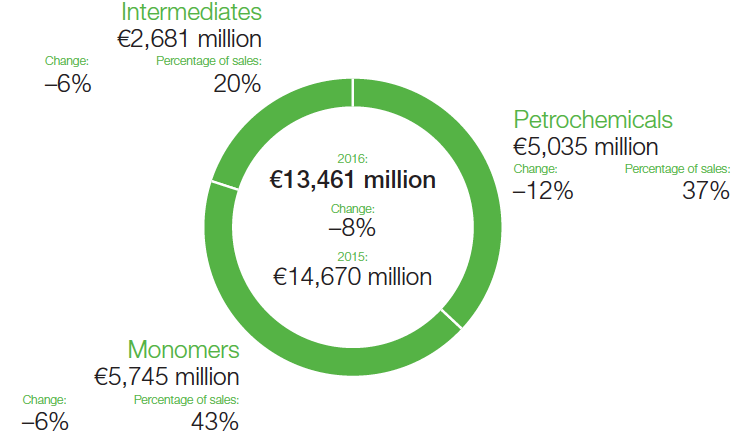Segment profile
The Chemicals segment consists of the Petrochemicals, Monomers and Intermediates divisions. In our integrated production facilities – our Verbund – we produce a broad range of basic chemicals and intermediates in Europe, Asia, North America and South America for our customers.
Divisions
Petrochemicals
Broad range of basic products and specialties for sectors such as the chemical and plastics industries
Monomers
Isocyanates and polyamides as well as inorganic basic products and specialties for various branches, such as the plastics, automotive, construction and electronics industries
Intermediates
Most comprehensive intermediates portfolio in the world, including precursors for coatings, plastics, textile fibers and crop protection products
Sales

How we create value – an example
Biomass Balance Approach
A groundbreaking way of using renewable resources in the Verbund
Value for BASF
>40
Externally certified products since introduction
Value for our customers and the environment
up to 100%
Increased use of renewable in place of fossil raw materials per product
Since 2013, we have been in a position to flexibly replace fossil resources in our current Verbund system with sustainably generated bio-based raw materials by feeding raw materials like biogas or bionaphtha right into the beginning of the value chain. The method is independently certified1 and can be used in existing production facilities. Based on their formulations, we can already allocate and certify the proportion of biomass in more than 40 sales products. Extensions to this portfolio can be accomplished within a short amount of time and enable us to quickly react to growing interest in the use of renewable resources.
1 Certification standard “Renewable raw materials” of the independent inspection authority TÜV SÜD, Munich, Germany
The approach can be applied to many of our products and adjusted to customer specifications. Up to 100% of a product’s fossil raw materials can be replaced by sustainably produced biomass while retaining identical product quality. Some of the products already certified include dispersions, superabsorbents and plastics. The certification makes it easier for our customers to place products on the market that have been produced with the help of renewable resources.
Strategy
- Integrated production facilities form core of Verbund
- Technology and cost leadership provide most important competitive edge
With its production facilities, the Chemicals segment is at the heart of the Verbund structure and supplies BASF’s segments with basic chemicals for the production of downstream products. We add value with innovations in processes and production, and invest in future markets to ensure the growth of the entire BASF Verbund. As a reliable supplier, we market our products to customers in downstream industries. We continually improve our value chains and are expanding our market position – particularly outside Europe – with new processes and technologies, as well as through investments and collaborations in future markets.
We invest in research and development in order to develop new technologies and to make our existing technologies even more efficient. Cost leadership and a clear orientation along individual value chains are among our most important competitive advantages. We concentrate on the critical success factors of the classical chemicals business: making use of economies of scale, the advantages of our Verbund, high capacity utilization, continuous optimization of access to raw materials, lean processes, and reliable, cost-effective logistics. Furthermore, we are constantly improving our global production structures and aligning these with regional market requirements.
In Ludwigshafen, we will strengthen the Verbund by replacing our acetylene plant, which occupies a central role for many products and value chains, with a modern, highly efficient plant by 2019.

